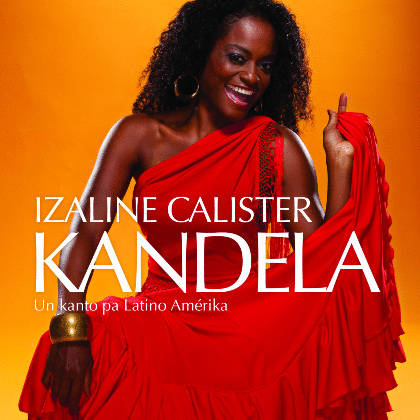
Songs
- artist:Izaline Calister
- featured artist:Izaline Calister
- region:Caribbean
- release year:2012
- style(s):Latin, World Jazz
- country:Netherlands
- formats:CD (Compact Disc)
- record posted by:Stroom Management
- label:EZC Records
- buy this record
In 2012 Curaçaoan singer Izaline Calister released her seventh music album called Kandela [Fire] on which she performs Cuban boleros, Brazilian bossa novas and other Latin American music in Papiamentu, her mother tongue. In the following interview with Peter Bruyn of Het Parool she explains the Latin tang of Kandela and the purpose behind writing songs.
“My mother would listen to a lot of Curaçaoan music,” says Izaline Calister (43). “But my father also played all sorts of music from Latin America and we used to watch Venezuelan television every day. I thought, after six albums with strictly Antillean music, it is now time to pay attention to a different part of my heritage. After all, one of every three songs you hear in Curaçao is in Spanish, is Latin.”
Kandela is the name of the new album by the Antillean diva who lives in the Netherlands. She has dedicated it to her father. Kandelaexpands her musical spectrum, but it is not because of a desire to conquer the rest of South America. Calister: “I was ready to broaden my horizons anyhow. And I already did so many Brazilian songs when I studied at the Conservatory. All cultures with a slavery past basically have comparable rhythms: Brazil, Cuba, Venezuela, the Antilles – it all eventually goes back to Mali and Senegal.”
Izaline moved from Curaçao to Groningen [the Netherlands] when she was eighteen in order to study business administration. However, she was so attracted to singing that when she finished, she also went to the [Prins Claus] Conservatory. Her debut album,Soño di un Muhé [A Woman’s Dream], released in 2000, received critical acclaim. The songstress has focused expressly on the musical traditions of her island of birth, but has also added her own twist, for example, by singing new lyrics in Papiamentu that she composed herself. Speransa [Hope], issued in 2009, is her most successful album to date and earned her an Edison award. Now, on Kandela, she is spreading her wings. A notable song in this regard is the 7-minute-long ‘Kantika di despecho’ [Song of Spite], in which she has blended four well-known items by, amongst others, Oscar D’León and Celia Cruz. “It is not just some medley,” she explains. “They are all songs about the pangs of love. The best thing you can do with heartbreak is sing it away – at least, that is what we would always do.” So she wrote a new song – a frame, as it were, around the other songs.
Calister says that writing songs may actually be more important to her than singing. “It’s a very special talent and I am also becoming more confident about it. You can touch people profoundly with a song and that’s a talent you shouldn’t waste, I believe.” “There was a song called ‘Mi Pais’, ‘My Country’, on my previous album. In that song, I sing about the good and the not-so-good sides of Curaçao. I sing that I am sometimes worried and that I hope that God watches over us. I have recently noticed that this song really means something to people. They may refer to it on Facebook or such.”
“With my music I want to contribute to the future of Curaçao. I don’t want to sing only about ‘great dancing, dancing, dancing,’ which is what Latin American music tends to be associated with. I really want to voice the lyrical song in Papiamentu.” That connects with Calister’s countless projects in recent years on which she has collaborated with storytellers, with actors, or with a large group of women upon Leoni Jansen’s initiative. She sees her songs as part of a larger narrative. “I don’t know how much longer I will continue to sing, but writing is something that I may be able to do until I am ninety. And even when I am dead, my songs will live on.”
A scan of this original The Parool article in Dutch is available on the Facebook page of Izaline Calister and on the Facebook page of Prins Claus Conservatorium.


